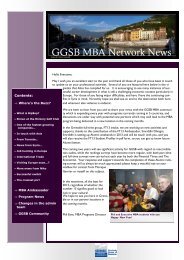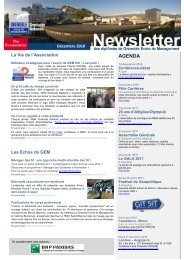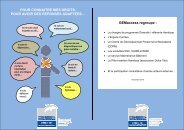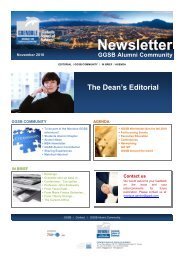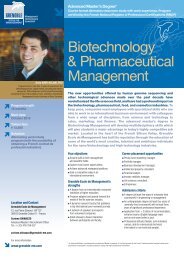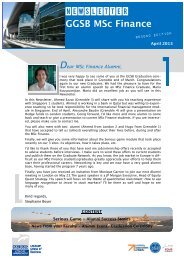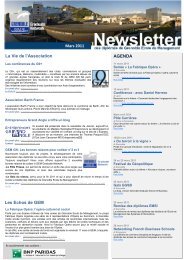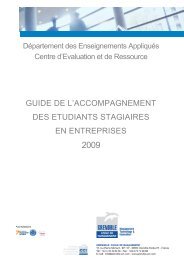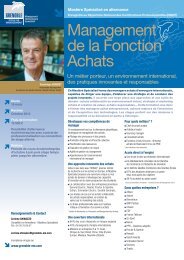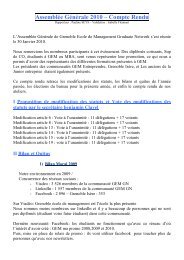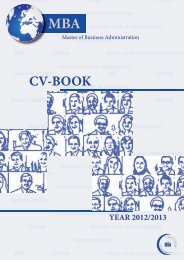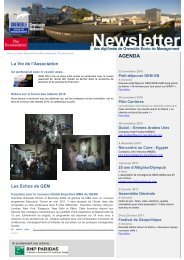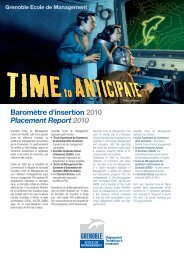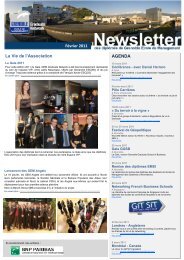Download
Download
Download
You also want an ePaper? Increase the reach of your titles
YUMPU automatically turns print PDFs into web optimized ePapers that Google loves.
1:30pm - 2:30pm Concurrent Tracks<br />
Choose one of the following interactive sessions or executive insight presentations<br />
during this time frame:<br />
Track 1 - B Multi Scenario Planning<br />
David Conley<br />
Innovation Program Manager<br />
Intel<br />
Principal, Innomation LLC<br />
✪ Veteran Exposure<br />
Executive Insight Presentation<br />
Limited Seating<br />
Planning for multiple scenarios often requires the analysis of, and reaction to, conflicting guidance<br />
and direction. The source of conflicting information and requirements can come from any<br />
number of sources including: scenario requirements themselves, differing needs of sectors,<br />
contradictions between sectors, and any other number of other sources. This session sets the<br />
stage for empowering you to take fundamental scenario planning to the next level.<br />
Key Take-Aways:<br />
g A fresh perspective on the key to effective multi-scenario planning<br />
g Best practices for identifying and organizing contradictory requirements<br />
g Analytical methods for use in effectively modeling multiple scenarios with a focus on the<br />
resolution of conflicting requirements<br />
Track 2 - A How Wide is Your Moat? Assessing Competitive<br />
Advantage<br />
Facilitator:<br />
Danielle Lorenzi<br />
Lead Business Intelligence Analyst<br />
Lorenzi Consulting, LLC<br />
◆ Early Exposure<br />
Interactive<br />
Limited Seating<br />
How sustainable is your competitive advantage? Revenue and profits are up, yet is your<br />
company ready for continued success? Participants will gain insight on how to access the<br />
sustainability of a company’s competitive advantage. You will walk away with tools on how to<br />
identify and rank resources that are key to your company’s survival and assess the sustainability<br />
of those resources. You will have an action plan on how to assess competitive advantage,<br />
identifying gaps where executives need to “shore up your company’s moat.”<br />
Case studies will be used to illustrate methods discussed.<br />
Key Take-Aways:<br />
g Corporate Strategy Framework<br />
g An understanding of resource attributes for a sustainable competitive advantage<br />
g A methodology to access the sustainability of competitive advantage<br />
Track 2 - B Increasing Objectivity in Indicator & Warning<br />
Analysis – a New Methodology<br />
Nimalan Paul Shelly Freyn<br />
Experienced Commercial Leader Assistant Professor<br />
General Electric Co. Mercyhurst College<br />
✪ Veteran Exposure<br />
Executive Insight Presentation<br />
Limited Seating<br />
A key objective of the competitive intelligence function is to provide top management with<br />
advance information on potential threats to the firm’s market position and on potential market<br />
opportunities. An effective tool towards fulfilling this two-pronged objective is Indicators and<br />
Warning (I&W) analysis. However, in this day and age where one is overloaded with information,<br />
there is a significant challenge in prioritizing and dealing with the available information objectively.<br />
This session will introduce a structured approach to enable prioritization and increase objectivity<br />
using the STEEP framework and Analysis of competing hypotheses (ACH) to enhance the<br />
effectiveness of I&W analysis.<br />
16<br />
AGENDA Wednesday<br />
Key Take-Aways:<br />
g A tool to identify and monitor key indicators and avoid getting overloaded with<br />
information<br />
g A collection plan to gather information related to the defined indicators and determine<br />
the level of threat based on analysis of the information collected<br />
g A method to establish an audit trail, which enables analysts and decision makers to see<br />
how a particular analyst conclusion was reached<br />
Track 3 - A How Technology is Revolutionizing the Art and<br />
Practice of CI<br />
Facilitator:<br />
Karen Rothwell<br />
Vice President, Consulting Practice<br />
Outward Insights<br />
◆ Early Exposure<br />
Interactive<br />
Limited Seating<br />
This interactive session will explore the changing landscape of the competitive intelligence<br />
discipline resulting from the growth of powerful technology tools. It will challenge some of the<br />
prevailing wisdom about the role that technology will play in the future of CI and will advocate<br />
for a greater reliance on the automation and indexing that new software platforms make possible.<br />
The session will focus on how we’ve been able to reduce the time commitment associated with<br />
traditional, labor intensive CI activities.<br />
Key Take-Aways:<br />
g Insights on the impacts that technology is likely to play in CI in the coming years and the<br />
way it will shape not only what CI functions can accomplish, but also the very nature of<br />
the way they function and are designed<br />
g Simple and proven tips for integrating technology into new and existing workflows with<br />
an emphasis on understanding the advantage that firms can accrue from the strategic use<br />
of CI technology<br />
g Real world examples of how technology can often reduce analyst work loads and in<br />
some cases replace entirely traditional CI tasks, freeing analyst to provide higher order<br />
benefits and analysis<br />
Track 3 - B Wikis in Intelligence: The Good, the Bad, the<br />
Reality<br />
Kristan Wheaton<br />
Associate Professor<br />
Mercyhurst College<br />
◆ Early Exposure<br />
Executive Insight Presentation<br />
Limited Seating<br />
With more than 100 strategic intelligence projects utilizing wikis to both manage the process<br />
and to produce the final report as its basis, this presentation condenses that experience into<br />
12 essential lessons learned for intelligence practitioners. Wikis have proven to be extremely<br />
valuable collaborative tools appropriate for a whole range of business uses. This presentation<br />
will focus on both the good and the bad of wikis in intelligence. Attendees will gain an<br />
evidence-based appreciation for the realities facing any analyst who seeks to use wikis to<br />
manage an intelligence project or produce an intelligence product.<br />
Key Take-Aways:<br />
g Insight on what is a wiki and why is it important to intelligence professionals<br />
g Recommendations for when to use (and when not to use) a wiki to produce<br />
intelligence products<br />
g Concrete ways to maximize the impact of wiki-based products with decision makers<br />
SCIP 2012 | www.scip.org



